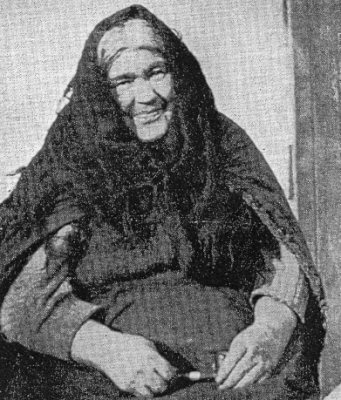Annie’s house was low and thatched, crushed between the country road and the foot of a South Armagh hill, like a limestone slab in the butt of a ditch. More than a huckster’s, her shop was an institution that defied the strangulation of rationing until well into the war years.
I can still feel the atmosphere. The key mood in Annie’s on Saturday nights was her own morose silence tickled by the deferential whisperings of the customers. It was almost a rural ritual. Rain, hail or snow, you always found the same individuals there – unless death, a cow calving, a returned American or ‘sitting up with the sow’ intervened. Each was in his appointed place, always wearing the same clothes, always seeming to say the same things – What’s up? What’s the good clothes for?
Her chimney always seemed to smoke, filling the kitchen from the mantelpiece to the rafters. When a man stood up, he was a mountain with his head buried in fog.
Even the shadows in her huckster shop had personality. In widening columns they leaned away from tin boxes, cakes of soap and an alarm clock on the mantelpiece with a galloping tick. Dripping out of the smoke canopy was an especial shadow that I always looked for. It was the shadow cast by the strap and buckle hanging from a pony-collar on the brace; in some secret draught it mocked a long-departed wag-of-the-wall.
Behind Annie herself was the window, little more than a foot square, the sash lined with spools of thread, a cocoa tin, and flanked by a half-plucked card of Someone’s Powders, boasting as many cures as Diancecht’s porridge.
On the edge of the hearthstone Annie sat in a low wicker chair. She always wore a black apron, drawn taut by her knees, a black shoulder-shawl and a woollen cap over her fine, white hair. And she was always twirling her thumbs. But her voice was clear and commanding and as hard as the hammers of hell.
Significantly one remembers mainly the dark nights one went to Annie’s… When over Glen Dhu, as over a fanlight on a door, rain-clouds cavorted in the glare of the hidden lights of Dundalk like hordes of witches in long, loose gowns, leaping an arc of illumination that shifted, swelled, drew in but never totally disappeared. You whistled going down her street to the doorway.
Inside you stood with bent head trying to identify the figures. Some sat on the edge of the table; others sat on the settlebed beside and between terraced pyramids of loaves. ‘Residenters’ only sat on chairs because they were ‘making a ceilie of it’, while some young boys sat on the hobs on either side of the fire.
from Michael J Murphy’s ‘Mountain Year’, Dolmen, 1964
More…
